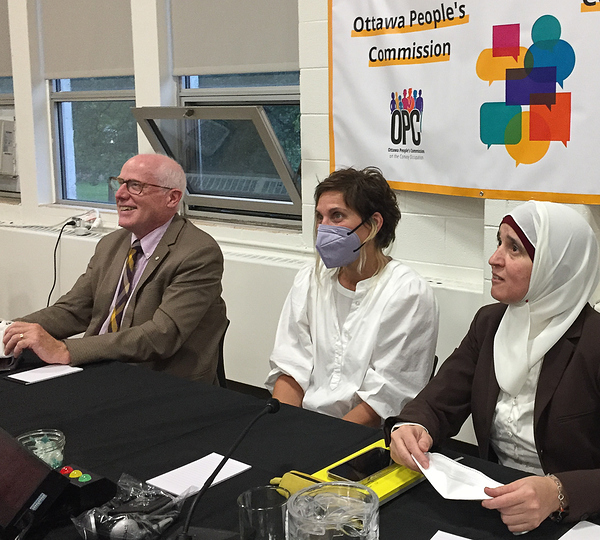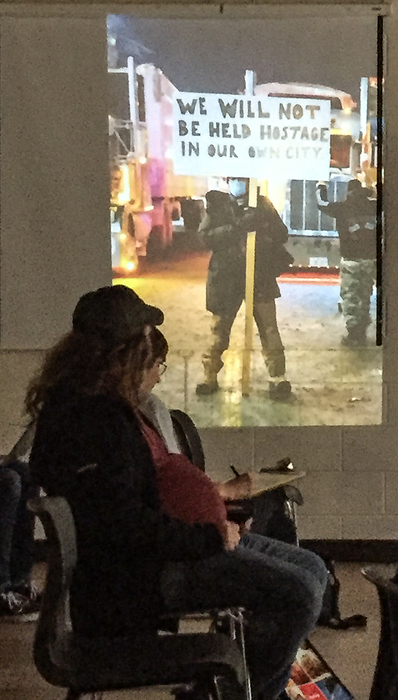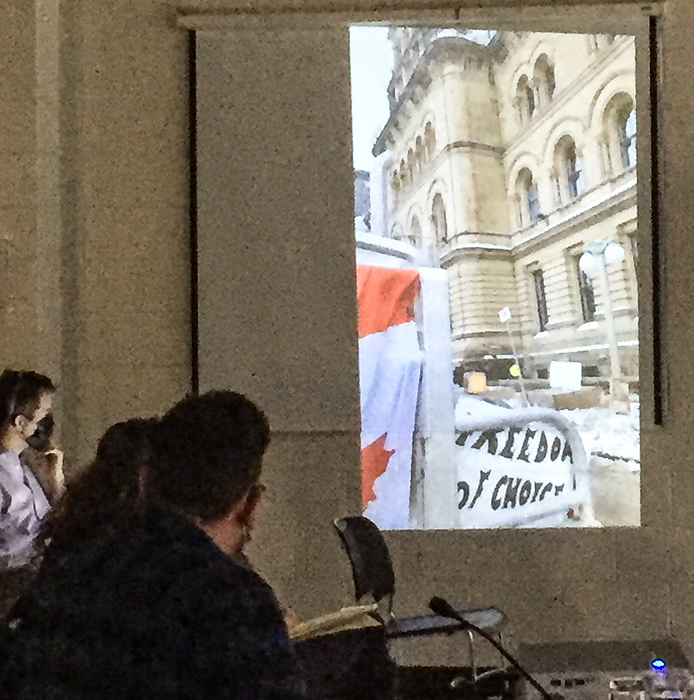
October 16: This story contains updates from the printed edition re future OPC hearing dates and the Public Order Emergency Commission.
Alayne McGregor
The opening session of the Ottawa People’s Commission hearings heard from four residents traumatized by the convoy occupation, and from one person who felt freed by the experience.
Noise, feces, garbage, and harassment were prominent in their testimony.
Three of the four commissioners were present at the September 21 session at McNabb Community Centre: Alex Neve, Leilani Farha, and Monia Mazigh. They listened carefully and asked follow-up questions. The speakers had to register with their full names but did not have to give them in public.
The session was opened by Algonquin activist Sheldon Brown, who said that most importantly the commission should set boundaries – to say what is unacceptable if an event like this happened again.
Pat Kiperchuk said the occupation was not a peaceful protest. She was unable to sleep for more than a week because of the constant noise near her apartment from tailgate parties. She had to order in groceries and couldn’t walk her dog, because she felt intimidated by the protesters, who constantly “egged on” residents and threatened violence. Her neighbourhood was filthy with human feces and people urinating on private property.
Her son and daughter-in-law lost at least $575 in employment income because they couldn’t get to work.
Protesters were using the F-word in front of children, carrying Nazi and F- Trudeau flags, and spreading hate, she said. She said it was the first time she was ashamed of fellow Canadians.

“Matt” made his own counter-protest by Parliament Hill for 10 hours in three days in early February, and showed video of his experience. He described being harassed while the police stood by and told him they couldn’t guarantee his safety. Large men surrounded him, blocked his sign with flags, and yelled in his face, he said, ending in him being pushed against a truck. He tried not to engage with them, but he could see he made some truckers angry.
He said he saw children in this noisy area without ear protection, some of whom looked “pretty distraught.”
A third witness, who had worked in emergency planning for the city, said the city should have been able to mitigate this situation and put plans into place. It’s “unthinkable” that city senior staff were not aware of the serious harm happening downtown by February 6, she said, and decisive leadership was missing. She could not understand the “deference” to the occupiers.
While she lived in a high rise on Gloucester during the occupation, she moved this summer. She argued those affected should also have been offered targeted support for their wellbeing after the occupation.

Stephanie Strudwick, who has lived downtown for 30 years, described the occupation as extreme, threatening, lawless, and dangerous: three weeks of physical and psychological violence. She said she saw young teenagers being harassed by truckers. A corner store owner was bullied when he asked them to put on masks, and closed his store.
On the other hand, “Christine”, who said she lived two blocks from McNabb, described the occupation as “patriots holding the line.” She said it allowed her to escape the “tyranny” of public health regulations that prevented her children from playing sports.
“The truckers came to set me free after I was kept in my house for two years.”
She spent about 50 hours at the occupation, and noted that free ear plugs were given to children.
Sessions continue
The People’s Commission has held three further sessions, one of which focused on people with disabilities, and another for those who supported the convoy.
It will hold a fifth session online on October 20 from 2 to 4:15 p.m. Pre-registration is required to attend or speak at a session. Other sessions will be held October 27 (evening), November 6 (afternoon), November 8 (evening), November 16 (evening), and November 24 (afternoon). See www.opc-cpo.ca/hearings/ for the schedule and to register.
The commission’s final report is expected next February.
Federal and city inquiries happening too
The city’s auditor-general announced recently that she will conduct two investigations into the response to the convoy occupation, one into the city’s actions, and one into the police and the police services board, rather than combining the two.
The first audit will examine “the City’s actions leading up to, during, and post the convoy protest. More specifically, the audit will focus on the approximately two-month period, starting in early January 2022, when the Freedom Convoy publicly announced their intention on converging in Ottawa, to when the Mayor lifted the state of emergency on February 24, 2022.” The second audit will “examine the OPS’ collaboration with City of Ottawa staff prior to and during the convoy protest as well as their communication with the OPSB.” It will “also examine the OPSB’s oversight role leading up to and during the convoy protest.”
At the federal level, the Public Order Emergency Commission began hearings this week, and will continue until November 25. Each session is broadcast live on the commission’s website and the video and transcript are posted there immediately afterwards.
On Friday, October 14, resident Victoria De La Ronde and Zexi Li, business improvement area representatives Kevin McHale (Sparks Street) and Nathalie Carrier (Vanier), and Councillors Catherine McKenney and Mathieu Fleury testified about their experiences before and during the occupation and their opinions of the city and and police response.
On October 17, Ottawa CAO Steve Kanellakos, mayor’s assistant Serge Arpin, Mayor Jim Watson, Councillor Diane Deans, and acting deputy chief of police Patricia Ferguson (Ottawa Police Service) are scheduled to testify.
A joint Parliamentary committee studying the decision to invoke the Emergencies Act continues to hold sessions. At the most recent session (October 6), former police chief Peter Sloly testified about the Ottawa police response.
